De Italiaanse schrijver Niccolò Ammaniti werd geboren in Rome op 25 september 1966. Zie ook alle tags voor Niccolò Ammaniti op dit blog.
Uit: Anna (Vertaald door Etta Maris)
“Hij was drie, misschien vier jaar. Hij zat keurig op een kunstleren stoeltje, het hoofd gebogen boven een groen t-shirt met korte mouwen. De omgeslagen pijpen van de spijkerbroek op de gympen. Met een hand hield hij een houten treintje vast dat als een rozenkrans tussen zijn benen hing.
De vrouw die aan de andere kant van de kamer op het bed lag kon net zo goed dertig als veertig zijn. Haar met rode vlekken en donkere korsten bedekte arm zat vast aan een leeg infuus. Het virus had haar gereduceerd tot een hijgend skelet, bedekt met een droge, puistige huid, maar het had niet al haar schoonheid kunnen wegnemen, die nog was terug te vinden in de vorm van haar jukbeenderen en het wipneusje.
Het jongetje richtte zijn hoofd op en keek naar haar, pakte de armleuning vast, stond op uit de stoel en liep met het treintje in zijn hand naar het bed.
Zij merkte het niet. Haar ogen, diep weggezonken in twee donkere poelen, staarden naar het plafond.
De kleine begon te spelen met een knoop van het vieze kussensloop. Zijn blonde haren bedekten zijn voorhoofd en in de zon die door de witte gordijnen scheen leken ze net nylondraden.
Plotseling richtte de vrouw zich op haar ellebogen op en kromde haar rug alsof haar ziel uit haar lichaam werd weggerukt, klemde de lakens in haar vuisten en viel schokkend van het hoesten achterover. Naar adem happend strekte ze haar armen en benen uit. Toen ontspande haar gezicht, sperde ze haar mond open en stierf met open ogen.
Het jongetje pakte voorzichtig haar hand en begon aan haar wijsvinger te trekken. Met een zacht stemmetje fl uisterde hij: ‘Mama? Mama?’ Hij legde het treintje op haar borst en liet het over de plooien van het laken glijden. Even raakte hij de met opgedroogd bloed bedekte pleister aan die de naald van het infuus bedekte. Ten slotte liep hij de kamer uit.
De gang was nauwelijks verlicht. Ergens klonk het biep biep van een medisch apparaat.
Het jongetje liep langs het lijk van een dikke man die naast een brancard lag. Zijn voorhoofd tegen de vloer, een been op een onnatuurlijke manier gebogen. Tussen de azuurblauwe panden van zijn overhemd was zijn lijkbleke rug zichtbaar.”
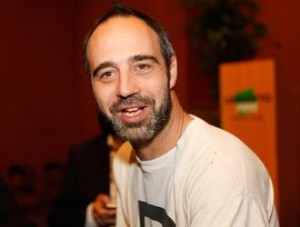
Niccolò Ammaniti (Rome, 25 september 1966)
De Amerikaanse schrijver David Benioff (pseudoniem van David Friedman) werd geboren in New York City op 25 september 1970. Zie ook alle tags voor David Benioff op dit blog.
Uit: City of Thieves
“You have never been so hungry; you have never been so cold. When we slept, if we slept, we dreamed of the feasts we had carelessly eaten seven months earlier—all that buttered bread, the potato dumplings, the sausages—eaten with disregard, swallowing without tasting, leaving great crumbs on our plates, scraps of fat. In June of 1941, before the Germans came, we thought we were poor. But June seemed like paradise by winter.
At night the wind blew so loud and long it startled you when it stopped; the shutter hinges of the burnt-out café on the corner would quit creaking for a few ominous seconds, as if a predator neared and the smaller animals hushed in terror. The shutters themselves had been torn down for firewood in November. There was no more scrap wood in Leningrad. Every wood sign, the slats of the park benches, the floorboards of shattered buildings—all gone and burning in someone’s stove. The pigeons were missing, too, caught and stewed in melted ice from the Neva. No one minded slaughtering pigeons. It was the dogs and cats that caused trouble. You would hear a rumor in October that someone had roasted the family mutt and split it four ways for supper; we’d laugh and shake our heads, not believing it, and also wondering if dog tasted good with enough salt— there was still plenty of salt, even when everything else ran out we had salt. By January the rumors had become plain fact. No one but the best connected could still feed a pet, so the pets fed us.
There were two theories on the fat versus the thin. Some said those who were fat before the war stood a better chance of survival: a week without food would not transform a plump man into a skeleton. Others said skinny people were more accustomed to eating little and could better handle the shock of starvation. I stood in the latter camp, purely out of self-interest. I was a runt from birth.”
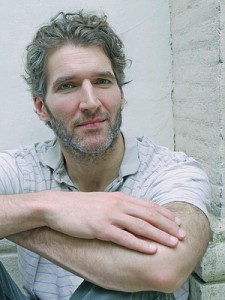
David Benioff (New York, 25 september 1970)
De Nederlandse schrijver Michael Reefs werd op 25 september 1986 geboren in Heerlen en groeide op in het Limburgse Vaals. Zie ook alle tags voor Michael Reefs op dit blog.
Uit: De Legende van de Hemelrijders
‘Melanie, ik geloof je! Kom alsjeblieft terug, het is allemaal mijn fout. Het spijt me.’ Er kwam niemand. De rest van het clubje was zelfs niet meer te horen. Ze waren zeker allemaal beneden op het plein en wachtten tot zij ook zou komen.
Vlak voor Luca klonk een harde klap. In een enkele seconde wist ze dat ze weg moest van deze plek, dat het hier veel te gevaarlijk was voor kinderen. Misschien zelfs te gevaarlijk voor volwassenen. Wat ze ook zeiden over die legende, het was allemaal waar. Luca twijfelde er helemaal niet meer aan. Ze wilde rennen, maar haar benen voelden zo zwaar. De ijzeren poort van het kasteel werd heel langzaam omhoog gehesen. Luca zag een zilverachtige gloed over de grond zweven, die razendsnel haar richting uitkwam. Te laat besefte ze dat dit een soort touw was, dat om haar voeten werd gebonden en haar vooruit trok. Ze schreeuwde en riep de namen van haar vrienden.
De afstand tot de poort werd steeds kleiner en Luca wist dat de tijd begon te dringen. Er schoten allerlei dingen door haar hoofd. De poort maakte opnieuw een geluid en rolde langzaam weer omlaag. Luca schoof er onderdoor en keek een laatste keer achterom. Op dat moment ging de poort voor haar neus dicht. Ze zat opgesloten in het griezelige kasteel.”
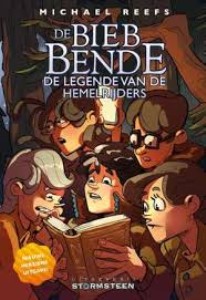
Michael Reefs (Heerlen, 25 september 1986)
Cover
De Spaanse schrijver Carlos Ruiz Zafón werd geboren op 25 september 1964 in Barcelona. Zie ook alle tags voor Carlos Ruiz Zafón op dit blog.
Uit: The Angel’s Game (Vertaald door Lucia Graves)
“Invariably dressed in im¬peccable silk suits and shiny Italian moccasins, Vidal had the looks and the manner of a matinee idol: fair hair always well combed, a pencil moustache, and the easy, generous smile of someone who feels comfort¬able in his own skin and at ease with the world. He belonged to a family whose forebears had made their pile in the Americas in the sugar busi¬ness and, on their return to Barcelona, had bitten off a large chunk of the city’s electricity grid. His father, the patriarch of the clan, was one of the newspaper’s main shareholders, and Don Pedro used its offices as a play¬ground to kill the tedium of never having worked out of necessity a sin¬gle day in his life. It mattered little to him that the newspaper was losing money as quickly as the new automobiles that were beginning to circulate around Barcelona leaked oil: with its abundance of nobility, the Vidal dynasty was now busy collecting banks and plots of land the size of small principalities in the new part of town known as the Ensanche.
Pedro Vidal was the first person to whom I had dared show rough drafts of my writing when, barely a child, I carried coffee and cigarettes round the staff room. He always had time for me: he read what I had written and gave me good advice. Eventually, he made me his assistant and would allow me to type out his drafts. It was he who told me that if I wanted to bet on the Russian roulette of literature, he was willing to help me and set me on the right path. True to his word, he had now thrown me into the clutches of Don Basilio, the newspaper’s Cerberus.
“Vidal is a sentimentalist who still believes in those profoundly un-Spanish myths such as meritocracy or giving opportunities to those who deserve them rather than to the current favorite. Loaded as he is, he can allow himself to go around being a free spirit. If I had one hundredth of the cash he doesn’t even need I would have devoted my life to honing sonnets and little twittering nightingales would come to eat from my hand, captivated by my kindness and charm.”
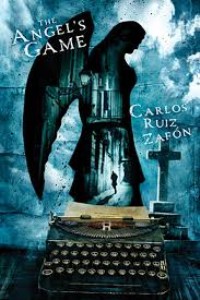
Carlos Ruiz Zafón (Barcelona, 25 september 1964)
Cover
De Poolse schrijver en letterkundige Andrzej Stasiuk werd geboren op 25 september 1960 in Warschau. Zie ook alle tags voor Andrzei Stasiuk op dit blog.
Uit: On The Road To Babadag: Travels In The Other Europe (Vertaald door Michael Kandel)
“Żyrardów was red, all brick. I got off with everyone else. I was shiftless here, but whatever I did was in tribute to those who had to get up before the sun, for without them the world would have been no more than a play of color or a meteorological drama. I drank strong tea in a station bar and took the train back, to go north in a day or two, or east, without apparent purpose.
One summer I was on the road seventy-two hours nonstop. I spoke with truck drivers. As they drove, their words flowed in ponderous monologue from a vast place — the result of fatigue and lack of sleep. The landscape outside the cabin window drew close, pulled away, to freeze at last, as if time had given up. Dawn at a roadside somewhere in Puck, thin clouds stretching over the gulf. Out from under the clouds slipped the bright knife edge of the rising day, and the cold smell of the sea came woven with the screech of gulls. It’s entirely possible I reached the beach itself then, it’s entirely possible that after a couple of hours of sleep somewhere by the road a delivery van stopped and a guy said he was driving through the country, north to south, which was far more appealing than the tedium of tide in, tide out, so I jumped on the crate and, wrapped in a blanket, dozed beneath the fluttering tarp, and my doze was visited by landscapes of the past mixed with fantasy, as if I were looking at things as an outsider. Warsaw went by as a foreign city, and I felt no tug at my heart. Grit in my teeth: the dust raised from the floorboards. I crossed the country as one crosses an unmapped continent. Between Radom and Sandomierz, terra incognita. The sky, trees, houses, earth — all could be elsewhere. I moved through a space that had no history, nothing worth preserving. I was the first man to reach the foot of the Góry Pieprzowe, Pepper Hills, and with my presence everything began. Time began. Objects and landscapes started their aging only from the moment my eye fell on them. At Tarnobrzeg I rapped on the sheet metal of the driver’s cabin; impressed by the size of a sulfur outcrop, I wanted him to stop. Giant power shovels stood at the bottom of a pit. It didn’t matter where they came from. From the sky, if you like, to bite into the land, to chew their way into and through the planet and let an ocean surge up the shaft to drown everything here and turn the other side to desert. The stink of inferno rose, and I could not tear my gaze from the monstrous hole that spoke of the grave, piled corpses, the chill of hell. Nothing moved, so this could have been Sunday, assuming there was a calendar in such a place.”
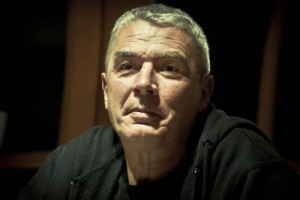
Andrzej Stasiuk (Warschau, 25 september 1960)
De Amerikaanse schrijver William Faulkner werd geboren op 25 september 1897 in New Albany, Mississippi. Zie ook alle tags voor William Faulkner op dit blog.
Uit: As I Lay Dying
“She ought to taken those cakes anyway,” Kate says.
“Well,” I say, “I reckon she never had no use for them now.”
“She ought to taken them,” Kate says. “But those rich town ladies can change their minds. Poor folks cant.”
Riches is nothing in the face of the Lord, for He can see into the heart. “Maybe I can sell them at the bazaar Saturday,” I say. They turned out real well.
“You cant get two dollars a piece for them,” Kate says.
“Well, it isn’t like they cost me anything,” I say. I saved them out and swapped a dozen of them for the sugar and flour. It isn’t like the cakes cost me anything, as Mr Tull himself realises that the eggs I saved were over and beyond what we had engaged to sell, so it was like we had found the eggs or they had been given to us.
“She ought to taken those cakes when she same as gave you her word,” Kate says. The Lord can see into the heart. If it is His will that some folks has different ideas of honesty from other folks, it is not my place to question His decree.
“I reckon she never had any use for them,” I say. They turned out real well, too.
The quilt is drawn up to her chin, hot as it is, with only her two hands and her face outside. She is propped on the pillow, with her head raised so she can see out the window, and we can hear him every time he takes up the adze or the saw. If we were deaf we could almost watch her face and hear him, see him. Her face is wasted away so that the bones draw just under the skin in white lines. Her eyes are like two candles when you watch them gutter down into the sockets of iron candle-sticks. But the eternal and the everlasting salvation and grace is not upon her.
“They turned out real nice,” I say. “But not like the cakes Addie used to bake.” You can see that girl’s washing and ironing in the pillow-slip, if ironed it ever was. Maybe it will reveal her blindness to her, laying there at the mercy and the ministration of four men and a tom-boy girl. “There’s not a woman in this section could ever bake with Addie Bundren,” I say. “First thing we know she’ll be up and baking again, and then we wont have any sale for ours at all.
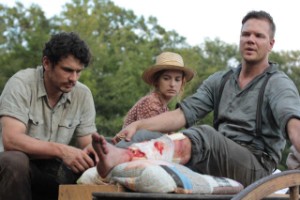
William Faulkner (25 september 1897 – 6 juli 1962)
James Franco (Darl) Ahna O’Reilly (Dewey) en Jim Parrack (Cash) in de film „As I Lay Dying” uit 2013
De Belgische dichteres en schrijfster Patricia Lasoen werd geboren op 25 september 1948 in Brugge. Zie ook alle tags voor Patricia Lasoen op dit blog.
Oude man met plastic tas
Met 1 plastic tas
van het warenhuis
met de rode zon
met gebogen schouders
traag te voet
langs de bleekgroene heesters
langs het dode kanaal
over het grote lege plein.
Duidelijk het javelwater *,
de melk en het brood
in het zakje.
Keert hij tevreden terug?
Stilleven met herfstvruchten
zoals altijd bij volle maan
zelfs na een afmattend orgasme
lig ik wakker en met hoofdpijn
in ons bed naar de gedaanten
van de vetplanten te staren.
merkwaardig klein voel ik me nu
vertrappeld door verwarde paardepoten
terwijl de mooie diernaam hazelworm
plots uit het donker opduikt
en mijn hoofd gekraakt wordt
als een okkernoot tussen de deurscharnieren.
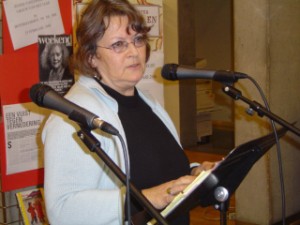
Patricia Lasoen (Brugge, 25 september 1948)
Zie voor nog meer schrijvers van de 25e september ook mijn vorige blog van vandaag.
